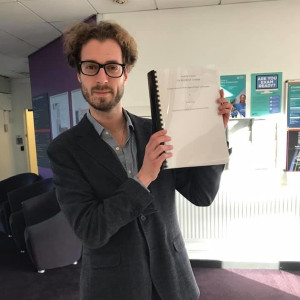Chapters
Some students have a really tough time planning and writing essays, and even a 1500-word thesis can get them in rather a state.
It is a good idea to get yourself used to essay-writing before you attempt a significant paper, like a university dissertation. Although a dissertation is usually around 10000 words long, remember that it is no different to a shorter essay, it is just magnified and therefore more detail needs to go in it.


How to Write a Good Essay
The most important thing for students to know when they begin writing essays is that, although a ‘perfect’ essay might exist, planning the perfect essay is virtually impossible.
Although each essay should be structured in a similar way, there is no prime number of paragraphs or points to be made, nor is there a predetermined checklist that teachers use to tick off requirements met for all essays across every subject. This is because no two essays are the same – essays are designed to allow ideas to flow freely and should display the writer’s personality and opinions.
By trying to emulate yours and others’ idea of a perfect essay, you could be stifling your creativity so dispel the idea that you must write in a certain way and just get writing.
As easy as that sounds, we understand why students are so caught up on the perfect piece of writing, as they are given unrealistic goals to reach. Websites and educational articles inundate pupils with details about perfect grades, perfect application forms for further education and, of course, how to write the perfect essay.
If this holy grail of essays does exist then how come each and every one of them has slightly different ideas on how to perfect it? If a perfect essay does indeed exist, it is only because you have made it perfect in the way that you have approached your chosen subject and how you have made links to come up with your ultimate conclusion.
If you were to ask a teacher if they could pick out one perfect essay from all of those they have ever seen, they would find it utterly impossible since every student has unique experiences to draw from and distinguishes their analysis of texts completely differently to others.
Furthermore, the emotions that are displayed in essays are what teachers want to see, and who is anyone to say that we should all feel the same thing when we read a book or write an essay?
Writing an essay can be a daunting task. There are many pitfalls for the unwary, but don’t despair! The advice below should help you avoid some of the common mistakes…
- Understand the question. Underline key points or words. Is it asking you to discuss, contrast, define or evaluate? Answer the question that’s actually on the page, not the question you wish was there.
- Do your research. Make detailed notes from your sources (books, articles, films). Make sure you always write down the full details of where any quotes or ideas come from. Exercise caution when using internet sources – Wikipedia, whilst a wonderful resource, should not be quoted as a source.
- Plan your structure. Start by just getting your ideas down with a spider diagram or a list. After you’ve done that, begin to re-arrange material into a more coherent structure, deciding on what to include in your introduction, your main points for each paragraph and how you will draw it all together in the conclusion.
- Use the active voice wherever possible. The active voice occurs when the subject of the sentence is also the ‘doer’: eg. ‘Hitler’s army invaded Poland’ rather than ‘Poland was invaded by Hitler’s army’. The first sentence is much more direct and snappy – the passive voice can easily sound waffly.
- Don’t make sweeping generalisations. These can include sentences such as “Many people think that [insert opinion]”. Be specific – if you can’t say which people, and reference where they’ve said it, then it’s probably best to re-think what you’re writing.
- Be careful not to present other people’s ideas and opinions as your own. It’s easily done, but it’s still plagiarism. If you’re putting forward an opinion that you’ve read on a particular subject, write: ‘[Dr X] wrote in her paper on [Y] that it’s possible that [Z]’.
Most important, though, is to remember that your essay should be your chance to put across what you think and feel about a subject. If you can follow the advice above, and put something of yourself into your essay, then you’re onto something very good indeed.
Find a Skype English teacher here.
How to Write an Essay Plan
Most students will be aware that an essay starts with an introductory paragraph, followed by a series of points divided into paragraphs or subtitles and then culminating in a summary of the points made and the resulting conclusion.
Although some students are natural writers and can write an essay with minimal planning, most students need a plan or draft to work with. Whether you use a spider diagram, flow chart or just note down bullet points during this preparatory stage, you should try to visualise the paragraphs on the page and imagine how the entire piece will come together.
Learn more writing tricks with this complete guide to writing!

It is at this stage, when you are playing around with ideas and theories to discuss, that you should identify the order in which you will make your points. Good essays usually provide subtle links from one paragraph to the next, so do be sure to think in advance about which points lead smoothly onto the next.
It is whilst planning your essay that you will do the most research, as you will effectively be writing down a summary of what you intend to cover in your text. As such, you might re-read sections or chapters of your workbooks, go over notes taken in class, look at resources offered by your exam board (whether that be AQA, OCR, WJEC, Edexcel, Eduqas or another) or surf the Internet to find interesting critiques or evaluations that you could look into as part of your investigation.
Planning your essay and having the bones of your final piece in place can do a lot for your confidence, as you will have a clear direction and can feel positive that all you need to do from this point on is to expand on your initial thoughts. Knowing that you do not need to research and come up with a range of new avenues to follow can make it seem like the bulk of the work has already been done.
Find GCSE English tutor here.

Essay Structure
If you try to write an essay in the order in which it is to be read, you are going to encounter some difficulties. This is because, despite having planned what you are going to investigate, you still need to allow yourself some freedom during the writing process, otherwise your essay could wind up becoming monotone and mundane with little emotion to sway the reader with.
How to Structure an Essay
You should start your writing task by filling out the body of text, which means working through the points in your essay plan and adding a certain level of detail, quotes and other evidence to back up your thoughts. At this point, if any new ideas pop into your mind, follow your instincts and see where this analysis takes you.
So long as you do not allow yourself to get distracted from the point of the thesis, you can still get your essay back onto the course you had mapped out. You never know, it could be these spontaneous changes in direction which take your essay from a good one to a great one. You might even describe it as your perfect essay!
The time it takes to write your essay is irrelevant. If you are a fast writer, then writing a 1500-word essay in the space of a couple of hours is not uncommon. Equally, spending two or three hours a night for a week on structuring your perfect essay could simply be the best system for you.
Just because your peers spent more or less time on their essays than you did, does not mean that your work is any stronger or weaker. Find out how writing every day can help you improve your focus!
If you're a beginner or trying to improve your English check out our guide for improving your writing skills. Or get help from an English tutor London, Birmingham, Newcastle or anywhere in the UK.
How to Write an Introduction to an Essay
A top essay writing tip is to always leave your introduction and conclusion until last, even though this goes against your instincts. The introduction of an essay, by nature, tells the reader what you plan to look at in the thesis and gives them an idea of where this essay might take them.
Introductions should remain quite vague though, as do not forget that that you have not yet investigated your points at this stage and thus do not want to take anything away from your concluding paragraph. Introductions do not need to be smart, as they are just the first in a number of stepping stones towards a final statement or revelation.
You can find more details on aspects of writing essays here...

How to Conclude an Essay
The conclusion, meanwhile, summarises the key points made in the body of your text, fed by the various sources of information you have used to support these. The conclusive paragraph should ultimately answer the questions raised at the start of the piece and leave the readers with a lasting impression. It is here that you need to be smart and need to make it clear where your findings have come from and why it is that you feel this way in a concise manner.
Remember that your essay’s introduction and conclusion are very closely linked and therefore you should be able to read them together and see very clearly, acknowledgements in the latter to questions raised in the former. A clear narrative, reasoning and explanation are key!
If your conclusion does not fit in with your introduction, you may need to start over and re-write your introduction to make the transition from beginning to end appear seamless.
Additional Tips for Essay Writing
Teachers and examiners would agree that a successful essay is the culmination of a list of things. Some of the things they will be looking for are: a strong introductory statement, an interesting interpretation of the topic, a revelation or conclusion to sum up the points discussed and, of course, a good display of spelling, grammar, vocabulary and punctuation. Learn how to improve your spelling for better writing!
Do not complete your essay and then cast it to one side. Although you may be glad to see the back of it, the finishing touches can play a huge part in the perception of your final piece. This means to revise and proofreading the text numerous times, initially to check for errors and typos and then at least once more to ensure it flows well. You might also like to ask a friend or parent to read it and provide you with unbiased feedback.
Another thing to be aware of when editing your writing is tone and perspective (i.e. if you are writing in the first person as is most common in academic essays, be sure to stick to the pronoun ‘I’ throughout your piece when communicating your views).
Become the best essay writer with the help of a private English tutor.
Finally, you may find it useful to have a dictionary and thesaurus to hand when writing your essay, so that you can embellish the content a little.
If your vocabulary is limited, use a thesaurus to experiment with new words that fit in with your tone and writing style, which can in turn help to expand your word stock and the power of your lexicon.
If your essay is being marked as an original piece of work or, is a research paper of work for school or university, be sure to use citations, quotations and a bibliography to avoid plagiarism.
What do you think about the future of the English language lies? Join the discussion: do British students need more help in English spelling?















